Murray Goldberg
-
- Maritime Training Five Years from Now: A Look Ahead Maritime Reporter, Mar 2015 #22
For anyone involved in maritime training, now is an incredibly exciting time full of opportunity. More than ever before, there are new advanced techniques and technologies available that can significantly improve training outcomes and access to training, while keeping costs under control. Properly deployed, these advances will improve safety - on that, the research is very clear.
This article looks at training in the maritime industry and predicts how the advances will change training over the next 5 years. We are in the fortunate position of being able to say that the maritime industry is beginning to embrace the fact that training can indeed be improved - the “old” way is not always the “best” way. Now that we are on this path, there is no turning back in the face of improved outcomes. What changes will we see in maritime training over the next 5 years? There are many, but space is limited so we will focus on a few of the most notable.
Blended Learning
It is easy to argue that the biggest advance in training in the last 20 years has been blended learning. Blended learning means using more than one technique for training delivery. It is just beginning to take hold in the maritime industry and I suspect it will be the biggest story in maritime training over the next 5 years.
In practice, blended learning usually means combining on-line learning with face-to-face learning. There are many ways to “blend” the learning experience, but let’s look at one model - that of using on-line self-study as a precursor to classroom or on-board training. This is an incredibly successful model that has been proven in thousands of studies to significantly improve training while at the same time being reasonably inexpensive and easy to implement.
It is easy to understand how it can be helpful. Imagine a vessel familiarization course which begins with some online self-study followed by on-board instructor-led training. The on-line study would likely focus on foundational knowledge about the vessel, equipment, layout, routines, and so on. The instructor-led on-board training would then continue the process by developing the hands-on experience and skills to complete the learning.
There are many advantages over conventional training. First, the initial portion, being online, is very “trainee centered” meaning candidates can proceed at their own pace and on their own terms - increasing the likelihood that they will learn the required knowledge successfully. It is also a fortunate coincidence that on-line training can be comparatively inexpensive, especially since the need for travel is eliminated.
Second, the on-line portion is guaranteed to teach company-vetted best practices. Most other forms of training, whether they are classroom or (especially) job-shadowing, are subject to a wide degree of variation according to the personal experience, biases and abilities of the instructor. This lack of standardization can be dangerous in a safety-critical environment such as the maritime industry. Online training means you are in control of what is being trained.
Third, when the candidates arrive on-board or in class for their instructor-led training, all candidates now have a very uniform level of knowledge. This allows the instructor-led training to be much shorter because the “knowledge” portion of the training has already been covered. Secondly, the instructor-led training is far more efficient because the instructor has less variability to accommodate in the trainees.
If the maritime industry follows the successful path of higher education and other industries (and I see no reason to believe it will not), then blended learning will be a huge story over the next 5 years.
Analytics
Another trend that is sure to impact maritime training is the availability and use of analytics in training. A favorite business mentor of mine once said “if you can’t measure it, you can’t manage it”. Nowhere does this apply more than it does in training. Yet until recently, most organizations had no mechanism to measure the effectiveness of their training program. This is where analytics comes in. Simply said, analytics are just measurements of the health of the training we provide. Examples of analytics include measurements such as:
● Average exam scores (determine how your trainees are doing overall),
● Average exam scores segmented by competency (determine whether some competencies are not being learned),
● Average time on learning materials or in classes compared to performance scores (determine the efficiency of your training),
● Or even performance segmented by employee background (determine which kinds of backgrounds yield better performers).
The point of knowing this type of information is two-fold. First, it allows you to find hidden training problems before they become performance issues or, worse, an accident. And second, knowing these numbers allows you to apply changes to your training and then determine whether the change made a positive impact. This is the essence of continuous improvement. Without it, you are shooting in the dark.
In the past, these analytics have been very time consuming and expensive to calculate and maintain - so very few organizations (aside from the most safety conscious) took the time. Now, however, sophisticated on-line training tools called learning management systems (LMS for short) provide a broad set of actionable analytics. So as LMSs continue to spread throughout the maritime industry over the next five years, analytics will help to transform training training insight and sophistication.
Adaptive Learning
Every vessel is a world unto itself - with different equipment, different routines, different layouts, and even different corporate and flag-state regulations. So the training for personnel on any vessel - especially familiarization training, is by necessity unique to that vessel. Until recently, the only way to accomplish this efficiently is through job shadowing - a staple in the maritime industry.
Sadly, job shadowing is one of the worst forms of training. It is difficult to standardize, almost impossible to measure, and highly variable in its effectiveness. Fixing these issues requires the creation of company-vetted, best practice training resources and programs for every vessel in your fleet. That would be a very daunting and expensive process - both in terms of the initial creation and the maintenance.
Fortunately, a relatively new technique called “adaptive learning” can help to solve this problem. Adaptive learning is a feature of some learning management systems. In essence, adaptive learning tailors the training program to each individual trainee - automatically. An LMS which supports this feature asks the trainee what role and vessel they are training for, and then automatically creates a set of company-vetted learning materials from training materials in the database. Each trainee receives an online, custom textbook targeted to that trainee. Adaptive learning has been in use in other industries to varying degrees and is already in use by some safety-conscious vessel operators. No other industry that I am aware of can make use of this feature as effectively as the maritime industry. Therefore, adaptive learning is an important innovation to watch over the next 5 years.
This is an incredibly exciting time in maritime education. Change is afoot - and there is a formidable arsenal of tools waiting to be deployed for the benefit of safety in our industry.
As indicated in the introduction of this article, if you are involved in maritime training in any way, it is time to take a hard look at your training practices because there are advances available that can significantly improve training outcomes, performance and safety.(As published in the March 2015 edition of Maritime Reporter & Engineering News - http://magazines.marinelink.com/Magazines/MaritimeReporter)
-
- SailSafe: A SEA Change for the Better Marine News, Jan 2016 #24
SEA. The Authors Jeff Joyce is BC Ferries’ Director of Fleet Operations and has been the SEA Project Owner since its inception in 2008. Murray Goldberg is CEO of Marine Learning Systems (www.MarineLS.com). An eLearning researcher and developer, his software has been used by 14 million people worldwide
-
- Maritime Training & Continuous Improvement Maritime Reporter, Jan 2016 #14
so, we will look at KPIs that are useful in this environment, and how to gather those KPIs. Until then, happy New Year and keep safe! The Author Murray Goldberg is CEO of Marine Learning Systems (www.MarineLS.com). An eLearning researcher and developer, his software has been used by 14 million people worldwide
-
- Distance Learning: Continuous Improvement Part 2 Maritime Reporter, Feb 2016 #18
series will discuss examples of LMS-enables KPIs and leading indicators which can provide incredible insight into training effectiveness. The Author Murray Goldberg is CEO of Marine Learning Systems (www.MarineLS.com). An eLearning researcher and developer, his software has been used by 14 million people worldwide
-
- Maritime Training: Implementing CI in Familiarization Training Maritime Reporter, Mar 2016 #16
their use very common outside the maritime industry, and which is now greatly accelerating their use within the maritime industry. The Author Murray Goldberg is CEO of Marine Learning Systems (www.MarineLS.com). An eLearning researcher and developer, his software has been used by 14 million people worldwide
-
- The Training Implications of Subchapter M Maritime Reporter, Nov 2016 #19
the true goals of Subchapter M, let us be sure to carefully consider and address the training implications and opportunities. The Author Murray Goldberg is CEO of Marine Learninf Systems, maker of MarineLMS. A researcher and developer of learning management systems, his software has been used by
-
- Improved Safety and Training, Step-by-step Maritime Reporter, Jun 2017 #16
in next month’s edition of Maritime Reporter & Engineering News. So check this space in a month and until then, sail safe! The Author Murray Goldberg id CEO of Marine Learning Systems, maker of MarineLMS. A researcher and developer of learning management systems, his software has been used by
-
- Improved Safety and Training, Part II Maritime Reporter, Jul 2017 #14
third and final installment of this series to it. So, please check this space next month in Maritime Reporter & Engineering News. The Author Murray Goldberg is CEO of Marine Learning Systems, maker of MarineLMS. A researcher and developer of learning management systems, his software has been used by
-
- Five Requirements for Safe Ops Maritime Reporter, Nov 2017 #22
necessary it is to start making each one of those changes. That is where the commitment from the top comes in. Are you ready? The Author Murray Goldberg id CEO of Marine Learning Systems, maker of MarineLMS. A researcher and developer of learning management systems, his software has been used by
-
- Training Tips for Ships Maritime Reporter, Jun 2019 #8
studying their preferable option and the path of least resistance, which is exactly the goal of a sound assessment methodology.About the Author: Murray Goldberg is CEO of Marine Learning Systems which provides software and services to optimize knowledge, skills and behavior in maritime operators. In his
-
- Training Tips for Ships: Never Give the Same Exam Twice Maritime Reporter, Sep 2019 #8
We’ve all heard the stories, and many of us have seen it first-hand: the completely ineffective assessment practice of giving the same multiple-choice exam to people over and over. The only time this is ever acceptable is when all of the people writing the exam are doing so at the same time and are supervised
-
- Training Tips for Ships: Taking the Stress out of Tests Maritime Reporter, Nov 2019 #10
you would like to improve nearly every aspect of your assessment program, incorporate as many opportunities as possible for self-evaluation.The AuthorMurray Goldberg is CEO of Marine Learning Systems which provides software and services to optimize knowledge, skills and behavior in maritime operators. In his
-
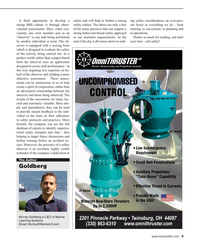 )
April 2024 - Maritime Reporter and Engineering News page: 9
)
April 2024 - Maritime Reporter and Engineering News page: 9oc- curs. Moreover, the presence of a safety observer is an excellent, highly visible reminder of the company’s dedication to The Author Goldberg Murray Goldberg is CEO of Marine Learning Systems. Email: [email protected] www.marinelink.com 9 MR #4 (1-17).indd 9 4/5/2024 8:36:11 A
-
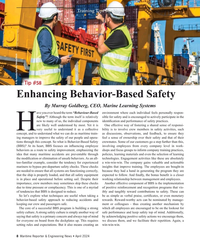 )
April 2024 - Maritime Reporter and Engineering News page: 8
)
April 2024 - Maritime Reporter and Engineering News page: 8Training Tips for Ships © By tuastockphoto/AdobeStock Tip #58 Enhancing Behavior-Based Safety By Murray Goldberg, CEO, Marine Learning Systems ave you ever heard the term “Behaviour-Based environment where each individual feels personally respon- Safety”? Although the term itself is relatively sible for
-
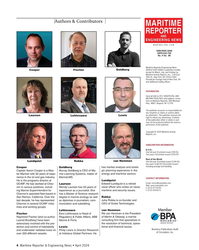 )
April 2024 - Maritime Reporter and Engineering News page: 4
)
April 2024 - Maritime Reporter and Engineering News page: 4years $180.00 (18 printed issues) including postage and handling. Cooper Goldberg has market analysis and strate- Captain Aaron Cooper is a Mas- Murray Goldberg is CEO of Ma- gic planning experience in the ter Mariner with 30 years of expe- rine Learning Systems, maker of energy and maritime sectors
-
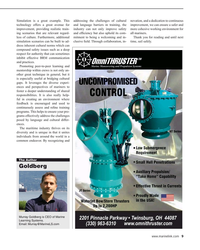 )
February 2024 - Maritime Reporter and Engineering News page: 9
)
February 2024 - Maritime Reporter and Engineering News page: 9on its diversity and is unique in that it unites individuals from around the world in a common endeavor. By recognizing and The Author Goldberg Murray Goldberg is CEO of Marine Learning Systems. Email: [email protected] www.marinelink.com 9 MR #2 (1-17).indd 9 2/6/2024 9:37:35 A
-
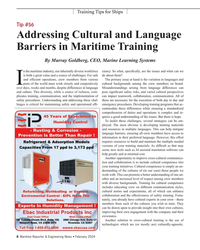 )
February 2024 - Maritime Reporter and Engineering News page: 8
)
February 2024 - Maritime Reporter and Engineering News page: 8Training Tips for Ships Tip #56 Addressing Cultural and Language Barriers in Maritime Training By Murray Goldberg, CEO, Marine Learning Systems n the maritime industry, our inherently diverse workforce ciency. So what, speci? cally, are the issues and what can we is both a great value and a source of
-
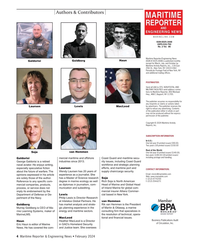 )
February 2024 - Maritime Reporter and Engineering News page: 4
)
February 2024 - Maritime Reporter and Engineering News page: 4is Director Research at Intelatus Global Partners. He van Hemmen Member Goldberg has market analysis and strate- Rik van Hemmen is the President Murray Goldberg is CEO of Ma- gic planning experience in the of Martin & Ottaway, a marine rine Learning Systems, maker of energy and maritime sectors. consulting
-
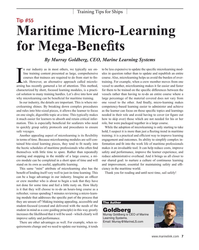 )
January 2024 - Maritime Reporter and Engineering News page: 7
)
January 2024 - Maritime Reporter and Engineering News page: 7Training Tips for Ships Tip #55 Maritime Micro-Learning for Mega-Bene? ts By Murray Goldberg, CEO, Marine Learning Systems n our industry as in most others, we typically see on- to be less expensive to update the speci? c microlearning mod- line training content presented as large, comprehensive ules in
-
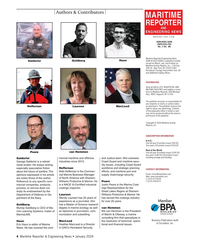 )
January 2024 - Maritime Reporter and Engineering News page: 4
)
January 2024 - Maritime Reporter and Engineering News page: 420 years of has served the coatings industry experience as a journalist. She for over 20 years. Member Goldberg has a Master of Science research Murray Goldberg is CEO of Ma- degree in marine ecology as well van Hemmen rine Learning Systems, maker of as diplomas in journalism, com- Rik van Hemmen is
-
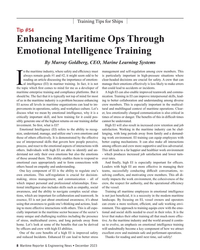 )
December 2023 - Maritime Reporter and Engineering News page: 8
)
December 2023 - Maritime Reporter and Engineering News page: 8Training Tips for Ships Tip #54 Enhancing Maritime Ops Through Emotional Intelligence Training By Murray Goldberg, CEO, Marine Learning Systems n the maritime industry, where safety and ef? ciency must management and self-regulation among crew members. This always remain goals #1 and #2, it might seem
-
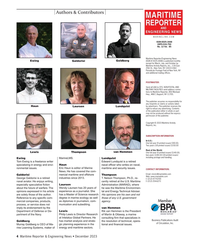 )
December 2023 - Maritime Reporter and Engineering News page: 4
)
December 2023 - Maritime Reporter and Engineering News page: 4rm that specializes in Business Publications Audit Goldberg has market analysis and strate- the resolution of technical, opera- of Circulation, Inc. Murray Goldberg is CEO of Ma- gic planning experience in the tional and ? nancial issues. rine Learning Systems, maker of energy and maritime sectors. 4 Maritime
-
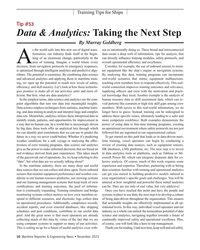 )
November 2023 - Maritime Reporter and Engineering News page: 10
)
November 2023 - Maritime Reporter and Engineering News page: 10Training Tips for Ships Tip #53 Data & Analytics: Taking the Next Step By Murray Goldberg s the world sails into this new era of digital trans- out us intentionally doing so. These broad and interconnected formation, our industry ? nds itself at the begin- data create a deep well of information, ripe for
-
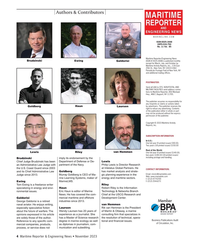 )
November 2023 - Maritime Reporter and Engineering News page: 4
)
November 2023 - Maritime Reporter and Engineering News page: 4. He CONTACT INFORMATION: and its Chief Administrative Law Goldberg has market analysis and strate- Email: [email protected] Judge since 2013. Murray Goldberg is CEO of Ma- gic planning experience in the Web: www.marinelink.com rine Learning Systems, maker of energy and maritime sectors. t: (212)
-
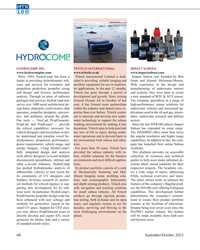 )
September 2023 - Marine Technology Reporter page: 68
)
September 2023 - Marine Technology Reporter page: 68is dedi- Impact Subsea was founded by Ben leader in providing hydrodynamic soft- cated to providing reliable imaging and Grant and Alastair Mclennan-Murray. ware and services for resistance and ancillary equipment for use in underwa- With experience in the design and propulsion prediction, propeller
-
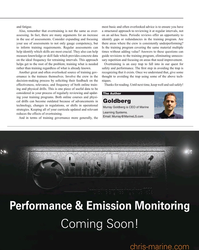 )
September 2023 - Maritime Reporter and Engineering News page: 11
)
September 2023 - Maritime Reporter and Engineering News page: 11courses and physi- cal drills can become outdated because of advancements in Goldberg technology, changes in regulations, or shifts in operational Murray Goldberg is CEO of Marine strategies. Keeping all of your curricula updated and relevant Learning Systems. reduces the effects of overtraining. Email:
-
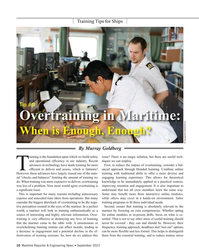 )
September 2023 - Maritime Reporter and Engineering News page: 10
)
September 2023 - Maritime Reporter and Engineering News page: 10Training Tips for Ships Tip #51 Overtraining in Maritime: When is Enough, Enough? © AytugAskin/AdobeStock By Murray Goldberg raining is the foundation upon which we build safety issue? There is no magic solution, but there are useful tech- and operational ef? ciency in our industry. Recent niques we can
-
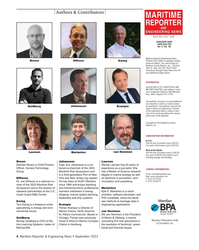 )
September 2023 - Maritime Reporter and Engineering News page: 4
)
September 2023 - Maritime Reporter and Engineering News page: 4. Based in Rik van Hemmen is the President Goldberg Chicago, Florian was previously of Martin & Ottaway, a marine Business Publications Audit Murray Goldberg is CEO of Ma- Head of Allianz’s Marine Complex consulting ? rm that specializes in of Circulation, Inc. rine Learning Systems, maker of Claims
-
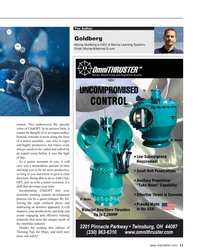 )
August 2023 - Maritime Reporter and Engineering News page: 11
)
August 2023 - Maritime Reporter and Engineering News page: 11The Author Goldberg Murray Goldberg is CEO of Marine Learning Systems. Email: [email protected] cannot. This underscores the speci? c value of ChatGPT. In its present form, it cannot be thought of as an expert author. Instead, consider it more along the lines of a junior assistant - one who is
-
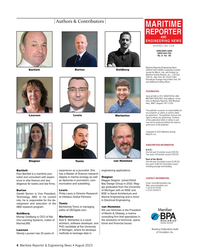 )
August 2023 - Maritime Reporter and Engineering News page: 4
)
August 2023 - Maritime Reporter and Engineering News page: 4. Bartolomej Tomic is managing van Hemmen editor of OEDigital.com. Rik van Hemmen is the President Member Goldberg of Martin & Ottaway, a marine Murray Goldberg is CEO of Ma- Marlantes consulting ? rm that specializes in rine Learning Systems, maker of Kyle E. Marlantes is a naval the resolution of
-
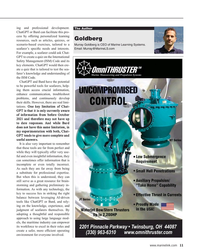 )
June 2023 - Maritime Reporter and Engineering News page: 11
)
June 2023 - Maritime Reporter and Engineering News page: 11this pro- cess by offering personalized learning Goldberg resources, such as articles, quizzes, or scenario-based exercises, tailored to a Murray Goldberg is CEO of Marine Learning Systems. Email: [email protected] seafarer’s speci? c needs and interests. For example, a seafarer could ask Chat- GPT
-
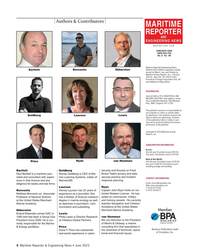 )
June 2023 - Maritime Reporter and Engineering News page: 4
)
June 2023 - Maritime Reporter and Engineering News page: 4$180.00 (18 printed issues) including postage and handling. Bartlett Goldberg security and focuses on Frost Paul Bartlett is a maritime jour- Murray Goldberg is CEO of Ma- Brown Todd’s privacy and data nalist and consultant with experi- rine Learning Systems, maker of security practice and incident
-
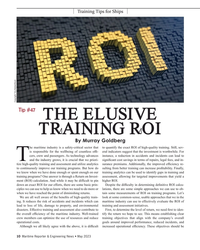 )
May 2023 - Maritime Reporter and Engineering News page: 10
)
May 2023 - Maritime Reporter and Engineering News page: 10Training Tips for Ships Copyright Tim/AdobeStock Tip #47 THE ELUSIVE TRAINING ROI By Murray Goldberg he maritime industry is a safety-critical sector that to quantify the exact ROI of high-quality training. Still, sev- is responsible for the wellbeing of countless of? - eral indicators suggest that the
-
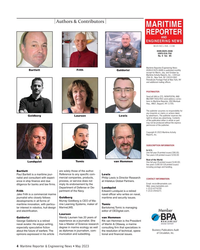 )
May 2023 - Maritime Reporter and Engineering News page: 4
)
May 2023 - Maritime Reporter and Engineering News page: 4marine naval of? cer who writes on naval, journalist who closely follows Goldberg maritime and security issues. developments in all forms of Murray Goldberg is CEO of Ma- maritime innovation, with particu- rine Learning Systems, maker of Tomic lar interest in robotics, hull design MarineLMS. Bartolomej
-
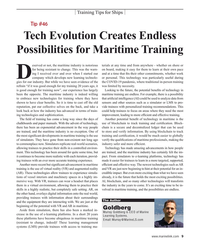 )
April 2023 - Maritime Reporter and Engineering News page: 9
)
April 2023 - Maritime Reporter and Engineering News page: 9with. We are just at the beginning of the potential with VR and AR in maritime. Goldberg Aside from simulation, there has also been a marked in- Murray Goldberg is CEO of Marine crease in the use of e-learning platforms. In a short 20 years Learning Systems. these platforms have become ubiquitous in
-
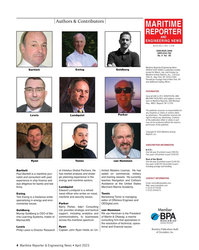 )
April 2023 - Maritime Reporter and Engineering News page: 4
)
April 2023 - Maritime Reporter and Engineering News page: 4and ronmental issues. Parker OEDigital.com. Barry Parker, bdp1 Consulting Goldberg Ltd. provides strategic and tactical van Hemmen Member Murray Goldberg is CEO of Ma- support, including analytics and Rik van Hemmen is the President rine Learning Systems, maker of communications, to businesses
